Twenty Years After The Tsunami 2004: How Knowledge Transfer Could Improve Safety In Countries at Risk
World Broadcasting Union
Session 207
The 2004 Indian Ocean Tsunami sent shock waves around the globe. With over 225,000 lives lost across 15 Asian and African countries, this is one of the biggest natural disaster in recorded history. It was also a wake - up call for nations in the Southern Hemisphere not only to establish warning systems for tsunami but for multi – hazards threats, especially in the most climate change vulnerable countries.
Great strides have been made in this direction thanks to the efforts of all stakeholders in the Early Warnings and DRR at community, national and regional levels. However, much more must be done to work together not only to save lives but also protect livelihoods since disasters wipe out years of economic development.
This session will examine what is the status quo of tsunami and multi – hazard warning systems and how technological and other knowledge transfer between nations and stakeholders has contributed to the development of modern warning systems across the Global South.
We will also look at cooperation and innovation as a key to comprehensive knowledge transfer and how media can accelerate knowledge transfer to people in danger, especially the most vulnerable groups.
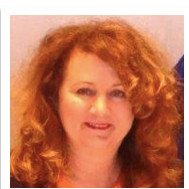
Natalia brings over two decades of diverse media experience, spanning journalism, reporting, production, presentation, and management in print and electronic media, including a decade at the BBC.
In 2010, Natalia joined the Asia-Pacific Broadcasting Union (ABU) as Head of the Secretary-General's Office. Here, she initiated innovative outreach campaigns, such as "Media Saving Lives: Building Resilient Communities" and "Broadcasting for All: Diversity and Inclusion in the Media."
One of her significant achievements was launching the ABU annual Media Summit on Climate Action and Disaster Prevention in 2014. Natalia was also instrumental establishing the UNDRR/WBU Media Saving Lives initiative in 2019, which she continues to manage as a Global Project Manager and Coordinator for the Asia-Pacific region.
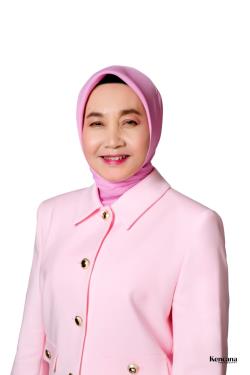
She became Head of Indonesia Agency for Meteorology, Climatology and Geophysics in November 2017. Prof Karnawati has been active in developing and promoting the National Multi Hazard Early Warning System and one of the key figures in the preparation of the Presidential Decree on Indonesian Early Warning System in 2019. She was elected as the Executive Council Member for the World Meteorological Organisation (2019 – 2023) and serves a second term as a Chair of the Intergovernmental Coordination Group of Indian Ocean Tsunami Warning and Mitigation System. In her recent position as Head of the Agency, she drives the innovaton on Early Warning Technology and Impact – based Forecasting Systems for Meteorology, Climatology and Geophysics, powered by big Data, Artificial Inteligence and Internet of Things, which are connected to Social Media, Mobile Apps and You Tube.
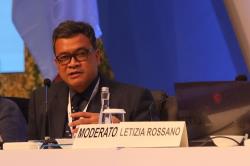
Dr. Raditya Jati
Deputy Minister of System and Strategy, National Disaster Management Authority (BNPB), Indonesia
Dr. Raditya Jati is a prominent figure in disaster management, currently serving as the Deputy Minister of System and Strategy at Indonesia’s National Disaster Management Authority (BNPB). With over two decades of experience, Dr. Jati has significantly influenced disaster management policies and practices in Indonesia and on the international stage.
Dr. Jati has been actively involved with the Strategic Advisory Group for UNDRR at the Regional Asia Pacific Office and several academic institutions, such as the Gadjah Mada University-Faculty of Geography. He has worked closely with the United Nations for Disaster Risk Reduction (UNDRR) and ASEAN to advance regional cooperation in disaster management.
His contributions are widely recognized, having represented Indonesia at United Nations forums and international conferences. Dr. Jati's commitment to community empowerment is evident through his work with NGOs and community-based initiatives.
He has received several prestigious awards, including the Young Scientist Award from Gadjah Mada University. Dr. Jati's professional training includes advanced courses in integrated coastal zone management and environmental impact assessment in Germany. His prolific publication record and involvement in numerous international projects underscore his dedication to advancing disaster management practices, integrating DRR into development frameworks, and building resilient communities for a sustainable future.

GIACOMO MAZZONE
expert in Climate Change and DRR Switzerland
Secretary General Eurovisioni Italy
Giacomo Mazzone has 30 years’ experience in the information, sport and international relations sectors, trained as a journalist, with a great deal of experience in international companies and organizations (RAI, Euronews, Eurosport, and latest EBU). He also has worked for all traditional media (press, radio, general interest TV) but also new media (all-news channels, Internet portals). Expert in European and international negotiations. in 2021 has been Global project manager at UNDRR, following the development of the project UNDRR-WBU to train media professionals to DRR Disaster Risk Reduction in the countries affected by Climate Changes
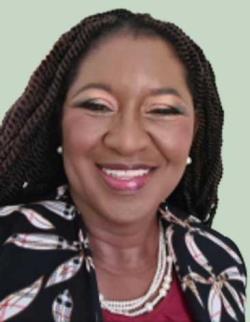
Sonia D. Gill
Secretary General of the Caribbean Broadcasting Union (CBU)
Sonia Gill is an accomplished attorney, development practitioner, and former broadcast journalist and media regulator. She is notably the first woman appointed as Secretary General of the Caribbean Broadcasting Union (CBU), serving from 2014-2018 and again from 2021 to the present.
During her tenure, Sonia introduced initiatives such as the CBU Media Share programming portal and expanded the Caribbean Media Awards to include digital and print media. She fostered collaborations with UNESCO, UNICEF Eastern Caribbean, PAHO, and the Public Media Alliance, and established partnerships with CARICOM Climate Change Centre, the Caribbean Disaster and Emergency Management Agency, and satellite company Eutelsat. She also led efforts to replace transmission equipment for radio services in Anguilla, Dominica, and the Turks and Caicos after Hurricanes Irma and Maria in 2017.
Sonia holds honours degrees from the University of the West Indies and the University of London. Between her CBU roles, she served as the Multi-Country Manager and Head of Programme for UNOPS in the Caribbean and as Assistant Resident Representative and Governance Advisor for the UNDP in Jamaica, Belize, the Bahamas, and the Turks and Caicos Islands.
A member of both the Barbados and Jamaica Bars, Sonia has also lectured in Constitutional and Administrative Law and was pivotal in developing the Children’s Code for Programming in Jamaica.
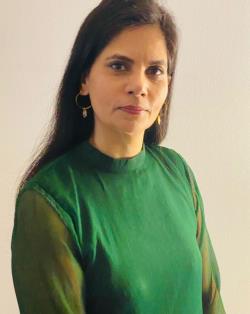
Vidya Rana is a disaster risk communication specialist with over 15 years of experience. Her work includes developing communications strategies, designing and facilitating capacity-building programs for journalists on disaster reporting, and crafting and implementing DRR advocacy campaigns in Asia and the Pacific. One of her notable achievements is the creation of a media capacity development program called 'Reporting on Disaster Mitigation and Preparedness (RedMap)', which has successfully enhanced the skills of journalists in multiple countries. She has also held key positions, such as the former head of ADPC's Communications and Knowledge Management Unit, and is currently a consultant with the World Bank, providing communication support to the Project Implementation Unit of the Somalia Crisis Recovery Project. She is furthering her knowledge in the field by pursuing her PhD at the Asian Institute of Technology (AIT), Thailand, where she explores the linkages between disaster risk governance and the communication strategies governments adopt. Additionally, Vidya Rana has firsthand experience as a journalist, covering a range of topics such as disasters, humanitarian response, human rights issues, conflict, and terrorism.
-
 C2. Information and communication infrastructure
C2. Information and communication infrastructure
-
 C3. Access to information and knowledge
C3. Access to information and knowledge
-
 C4. Capacity building
C4. Capacity building
-
 C7. ICT applications: benefits in all aspects of life — E-science
C7. ICT applications: benefits in all aspects of life — E-science
-
 C9. Media
C9. Media
C2. Information and communication infrastructure
Most of the victims of the great Tsunami of 20 years ago were provoked by the lack of information. Victims that occurred in places where the effects of Tsunami arrived hours later since the original hazard occurred, could have been avoided if communications lines among countries and continent could have better worked.
C3. Access to information and knowledge & C4. Capacity building
Not only was a problem of communication, but also was a problem of knowledge. Most of the victims (and event those in charge of civil protection) in many countries were not aware of what a Tsunami was and how it works. this lack of information and knowledge was the main reason for a so great balance of lost lives. What has been done in these 20 years to build the capacity to understand and to react is crucial to prevent that these phenomena could provoke so devastating effects in the future.
C7. ICT applications: benefits in all aspects of life — E-science
Early warning systems, better communication infrastructures and more efficient scientific tools to identify, prevent, predict and disseminate information are essential in the reduction of the impact of hazards like Tsunami.
C9. Media
Last but not least, all these scientific based prediction and early warning will have more impact on society as greater is their cooperation with media and media professionals.
-
 Goal 9: Build resilient infrastructure, promote sustainable industrialization and foster innovation
Goal 9: Build resilient infrastructure, promote sustainable industrialization and foster innovation
-
 Goal 10: Reduce inequality within and among countries
Goal 10: Reduce inequality within and among countries
-
 Goal 14: Conserve and sustainably use the oceans, seas and marine resources
Goal 14: Conserve and sustainably use the oceans, seas and marine resources
Goal 9: Build resilient infrastructure, promote sustainable industrialization and foster innovation
The experience of 2004 tsunami has been a strong alert signal requiring the adaptation of infrastructures and of the coastal constructions that is producing long lasting effects. Under this profile, are all country at risk of Tsunami ready for the next event ?
Goal 10: Reduce inequality within and among countries
Tsunami 2004 impact not only differed because of the proximity to the earthquake epicenter, but also because of the quality of the infrastructure of early warning and communication. Death losses in countries affected by the Tsunami impact 10000 km away from the epicenter is unacceptable, because there was all the time to warn populations in time.
Goal 14: Conserve and sustainably use the oceans, seas and marine resources
Thanks to Great tsunami of 20 years ago many regions of the world are now better prepared to reduce impact of this kind of phenomena. But this is not the case all over the world. There areas where Tsunami are not occurring since centuries, but that are nevertheless at risk. Serious and effective DRR policies are needed even in these areas, based on scientific evidence and in close cooperation with media.
https://www.jamco.or.jp/en/symposium/21/ - ABOUT THE ROLE OF BROADCASTERS IN TSUNAMI CRISIS
https://www.dw.com/en/tsunamis-of-the-21st-century/g-46847898 - THE WORST TSUNAMIS OF THE LAST 20 YEARS
https://iotic.ioc-unesco.org/iotic-contacts/